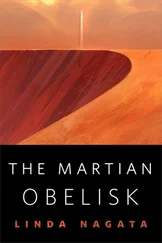“More natural, perhaps, but not more fair.”
“Fair?” I ask.
“In a complicated sense. I’m too tired now to disentangle it. Men with bald heads oughtn’t to fight. They ought to philosophize.”
“Then you’ll have a lonesome life. The times look like fighting.”
“Maybe not. Some kind of horrid carnival has come to an end. Doesn’t today feel like a cosmic Ash Wednesday? A huge soap bubble has burst.”
“And?” I say.
“And?” he replies.
“Someone will blow a new and bigger one.”
“Perhaps.”
We stop in the garden. The milky light of morning is streaming like a gray flood around the crosses. The youngest Knopf daughter appears, sleepy-eyed. She has been waiting up for us. “Father says you can buy back the headstone for twelve trillion.”
“Tell him we offer eight marks. And the offer only holds until noon today. Money will be very short.”
“What’s that?” Knopf asks from his bedroom window, where he has been listening.
“Eight marks, Herr Knopf. And after noon today only six. Prices are going down. Who would ever have expected that, eh? Instead of up.”
“I’d rather keep it through all eternity, you damned grave robbers!” Knopf screeches, slamming the window.
The Werdenbrück Poets’ Club is holding a farewell party for me in the Old German Room at the Walhalla. The poets are uneasy; they pretend deep feeling. Hungermann is the first to come up to me. “You know my poems. You yourself said they were one of your deepest poetical experiences. Deeper than Stefan George.”
He looks at me intently. I never said anything of the sort. It was Bambuss who said it: in return Hungermann said that he considered Bambuss more significant than Rilke. But I do not correct him. I look expectantly at the poet of Casanova and Mohammed.
“Well then,” Hungermann goes on, but his attention is distracted. “By the way where did you get that new suit?”
“I bought it today with a Swiss honorarium,” I reply with all the modesty of a peacock. “It’s the first new suit I’ve had since I was a soldier of His Majesty. No remade uniform. Real civilian clothes! The inflation is over!”
“A Swiss honorarium? So you’re already internationally known? Well, well,” Hungermann says, surprised and instantly rather vexed. “From a newspaper?”
I nod. The author of “Casanova” makes a deprecatory gesture. “I thought so!” Of course my things are not for the daily press! Only for first-rate literary magazines, if at all. Unfortunately a volume of my poems was published by Arthur Bauer here in Werdenbrück three months ago. An outrage!”
“Were you forced to do it?”
“Yes, morally speaking. Bauer lied to me. He said he was going to launch a terrific publicity campaign, he was going to enlarge his press and publish not only my work but Morike, Goethe, Rilke, Stefan George, and, above all, Holder-lin. He hasn’t done any of it.”
“He published Otto Bambuss,” I reply.
Hungermann frowns. “Bambuss—between us, a bungler and imitator. That did me harm. Do you know how many copies of my work Bauer has sold? No more than five hundred!”
I know from Bauer that the entire printing consisted of two hundred and fifty copies; twenty-eight have been sold and nineteen of these were bought secretly by Hungermann. And it was not Hungermann who was forced to publish but Bauer. Hungermann blackmailed him with the threat of recommending another book dealer to the high school where he teaches.
“Now that you’re going to be on a newspaper in Berlin,” Hungermann goes on, “you know, friendship among artists is the noblest thing in the world!”
“I know. The rarest too.”
“So it is.” Hungermann draws a slender volume out of his pocket. “Here—with a dedication. Write something about it in Berlin. And send me two proofs. On my side, I will keep faith with you here in Werdenbrück. And if you find a good publisher up there—the second volume is in preparation.”
“Agreed.”
“I knew I could rely on you.” Hungermann solemnly shakes my hand. “Aren’t you going to publish something soon?”
“No. I’ve given it up.”
“What?”
I’m going to wait a while,” I say. “I want to look around in the world a bit.”
“Very wise!” Hungermann exclaims with emphasis. “If only more people would do that instead of publishing immature stuff and getting in the way of their betters!”
He looks sharply around the room. I expect at least a wink, but he is all seriousness. I have turned into a business opportunity and his sense of humor has abandoned him. “Don’t tell the others about our arrangement,” he adds with emphasis.
“Certainly not,” I reply and see Otto Bambuss stalking me.
An hour later I have in my pocket a copy of Bambuss’s “Voices of Silence” with a flattering dedication, and, in addition, a carbon copy of the sonnet sequence “The Tigress,” which I am to get published in Berlin; from Sommerfeld a copy of the “Book of the Dead” in free verse, from other members a dozen additional works—and from Eduard a carbon of his “Paean on the Death of a Friend” in 186 lines, dedicated to “Valentin, Comrade, Fellow Warrior, and Man.” Eduard works easily and quickly.
Suddenly it all seems remote. As remote as the inflation, which died two weeks ago—or my childhood which was smothered overnight in a uniform. As remote as Isabelle.
I look at the faces around me. Are they still the faces of awestruck children, confronted by chaos and miracle, or are they already the faces of conscientious club members? Is there still something in them of Isabelle’s rapt and terrified countenance, or are they more imitators, noisily exploiting that tenth of a talent which every youth possesses, whose disappearance they boast of and enviously celebrate instead of cherishing it in silence and trying to preserve some bit of it for the future?
“Comrades,” I say. “I hereby resign from your club.”
All faces turn toward me. “Impossible! You’ll be a corresponding member in Berlin,” Hungermann declares.
“I’m resigning,” I say.
For an instant the poets are silent. They look at me. Am I mistaken or do I see something like the fear of discovery in the faces of some? “Do you really mean it?” Hungermann asks.
“I really mean it.”
“All right. We accept your resignation and we hereby make you an honorary member.”
Hungermann glances around. There is resounding applause. The faces relax. “Unanimously passed!” says the poet of Casanova.
“I thank you,” I reply. “This is a proud moment. But I cannot accept. It would be like being turned into a statue. Or a gravestone. I do not want to go into the world as the honorary member of anything—not even of our establishment in Bahnstrasse.”
“That’s not a nice comparison,” says Sommerfeld, the poet of Death.
“Give him leave,” Hungermann decrees. “Well then, how do you want to go into the world?”
I laugh. “As a spark of life struggling to avoid extinction.”
“Dear God,” Bambuss says, “isn’t there something like that in Euripides?”
“Possibly, Otto. Then there must be something to it. Besides, I don’t intend to write about it; I’m going to try to be it.”
“It isn’t in Euripides,” Hungermann, the academician, announces with a triumphant glance at Bambuss, the village schoolmaster. “So you intend—” he says to me.
“Last night I made a fire,” I say. “It burned well. You know the old marching order: travel light.”
They nod eagerly. They have long since forgotten it, I suddenly realize. “All right then,” I say. “Eduard, I still have twelve luncheon coupons. The inflation has overtaken them, but I believe I would still have the legal right, even if I had to go to court about it, to demand food from you. Will you trade two bottles of Reinhartshausener for them? We want to drink them now.”
Читать дальше








